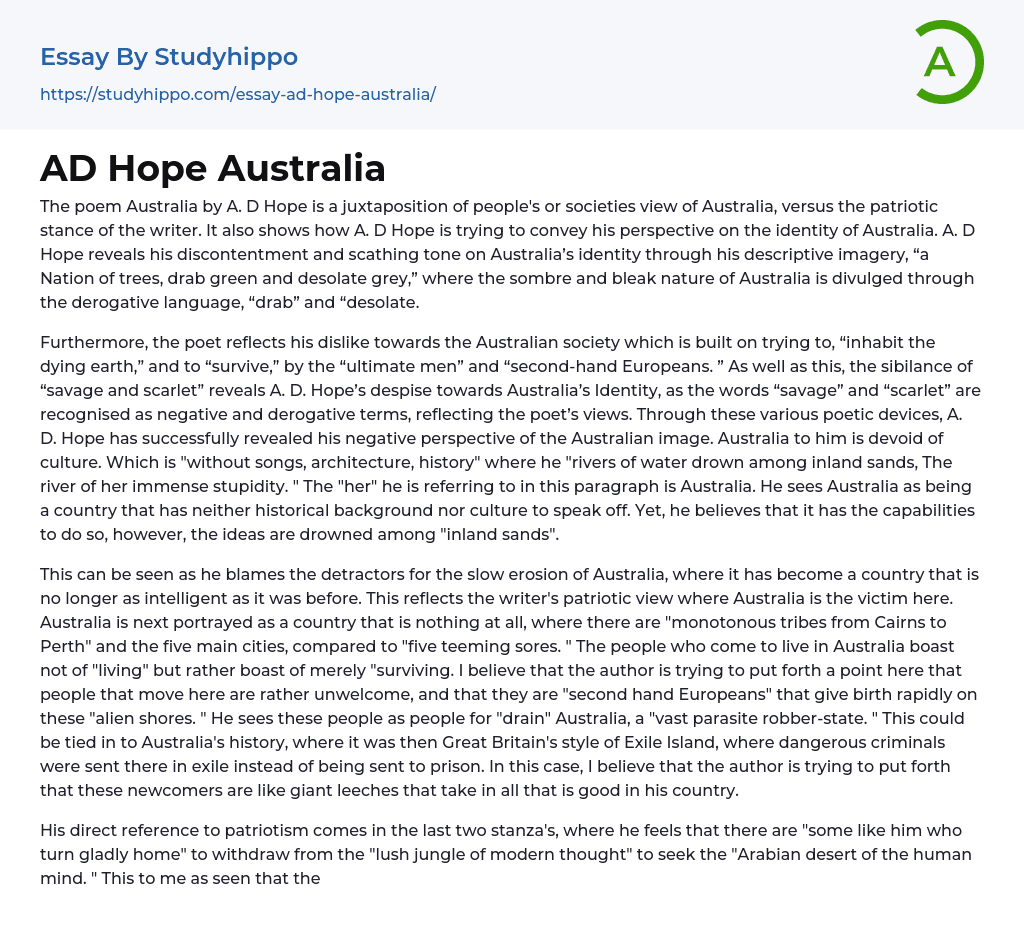The poem Australia by A. D Hope is a juxtaposition of people's or societies view of Australia, versus the patriotic stance of the writer. It also shows how A. D Hope is trying to convey his perspective on the identity of Australia. A. D Hope reveals his discontentment and scathing tone on Australia’s identity through his descriptive imagery, “a Nation of trees, drab green and desolate grey,” where the sombre and bleak nature of Australia is divulged through the derogative language, “drab” and “desolate.
Furthermore, the poet reflects his dislike towards the Australian society which is built on trying to, “inhabit the dying earth,” and to “survive,” by the “ultimate men” and “second-hand Europeans. ” As well as this, the sibilance of “savage and scarlet” reveals A. D. Hope’s despise towards A
...ustralia’s Identity, as the words “savage” and “scarlet” are recognised as negative and derogative terms, reflecting the poet’s views. Through these various poetic devices, A. D. Hope has successfully revealed his negative perspective of the Australian image. Australia to him is devoid of culture. Which is "without songs, architecture, history" where he "rivers of water drown among inland sands, The river of her immense stupidity. " The "her" he is referring to in this paragraph is Australia. He sees Australia as being a country that has neither historical background nor culture to speak off. Yet, he believes that it has the capabilities to do so, however, the ideas are drowned among "inland sands".
This can be seen as he blames the detractors for the slow erosion of Australia, where it has become a country that is no longer as intelligent as
it was before. This reflects the writer's patriotic view where Australia is the victim here. Australia is next portrayed as a country that is nothing at all, where there are "monotonous tribes from Cairns to Perth" and the five main cities, compared to "five teeming sores. " The people who come to live in Australia boast not of "living" but rather boast of merely "surviving. I believe that the author is trying to put forth a point here that people that move here are rather unwelcome, and that they are "second hand Europeans" that give birth rapidly on these "alien shores. " He sees these people as people for "drain" Australia, a "vast parasite robber-state. " This could be tied in to Australia's history, where it was then Great Britain's style of Exile Island, where dangerous criminals were sent there in exile instead of being sent to prison. In this case, I believe that the author is trying to put forth that these newcomers are like giant leeches that take in all that is good in his country.
His direct reference to patriotism comes in the last two stanza's, where he feels that there are "some like him who turn gladly home" to withdraw from the "lush jungle of modern thought" to seek the "Arabian desert of the human mind. " This to me as seen that the author enjoys retreating from the expansive world and would rather stay in a desert. In that case, all the above detractions that he mentioned are seen as added benefits of being an Australian. The last two lines of the poem are most memorable; he states "The
learned doubt, the chatter of cultured apes” Which is called civilization over there.
It leaves us with an impression of him seeing as Australia as being civilization and the rest of the world just being cultured apes which they merely call civilization without it really being so. This poem shows how A. D Hope feels that one’s identity can be robbed by circumstance like how Australia’s identity was robbed after the arrival of the British. In the end though he feels that due to the arrival of the British which caused Australia’s identity to be robbed, Australia’s identity has become a combination of the best of Australia and the immigrants who have made Australia their home.
- Australian Culture essays
- Book Summary essays
- Metaphor essays
- Reader essays
- Rhyme essays
- Literary devices essays
- Villain essays
- Books essays
- Genre essays
- Literary Criticism essays
- Writer essays
- Protagonist essays
- Simile essays
- Poem essays
- Book Report essays
- Book Review essays
- Greek Mythology essays
- Plot essays
- Tragic Hero essays
- Coming of Age essays
- Play essays
- Rhetoric essays
- Rhetorical Question essays
- Translation essays
- Understanding essays
- Reason essays
- Character essays
- Letter essays
- American Literature essays
- Literature Review essays
- Utopia essays
- Poetry Analysis essays
- Dante's Inferno essays
- Between The World and Me essays
- Incidents in The Life of a Slave Girl essays
- Flowers for Algernon essays
- Myth essays
- Everyday Use essays
- Boo Radley essays
- Genesis essays
- Richard iii essays
- Alice in Wonderland essays
- On the road essays
- Ozymandias essays
- The Nightingale essays
- Holden Caulfield essays
- Animal Farm essays
- 1984 essays
- A Hanging essays
- Shooting An Elephant essays




